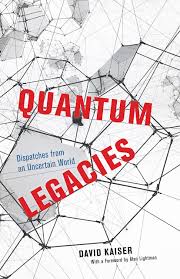Michael D. Gordin at the LARB:
 A few themes in particular resonate through this tour of quantum mechanics. The first is that people matter. That might sound obvious — you can’t have any physics if you don’t have physicists — but the point is subtler. The specific personalities matter, and they matter to specific cohorts, making them different from all other cohorts. Even when Kaiser tours the most rarefied and abstract corridors of theoretical physics, he never finds a solitary theorist mooning over a blackboard. All physics happens in conversation, whether it is Einstein and Ehrenfest joking at a physics meeting, or Schrödinger working out his famous thought experiment about a cat — killed (or not) probabilistically with a dose of poison gas — in correspondence with Einstein and other quantum dissidents. As Kaiser points out, it is no accident that, as Europe descended into fascist chaos and warmongering, “Schrödinger’s thoughts turned to poison, death, and destruction.” Even the main character of the first chapter, Paul Dirac, notorious as the weirdest weirdo to ever do theoretical physics, is presented as enmeshed in the communities that found him so inscrutable.
A few themes in particular resonate through this tour of quantum mechanics. The first is that people matter. That might sound obvious — you can’t have any physics if you don’t have physicists — but the point is subtler. The specific personalities matter, and they matter to specific cohorts, making them different from all other cohorts. Even when Kaiser tours the most rarefied and abstract corridors of theoretical physics, he never finds a solitary theorist mooning over a blackboard. All physics happens in conversation, whether it is Einstein and Ehrenfest joking at a physics meeting, or Schrödinger working out his famous thought experiment about a cat — killed (or not) probabilistically with a dose of poison gas — in correspondence with Einstein and other quantum dissidents. As Kaiser points out, it is no accident that, as Europe descended into fascist chaos and warmongering, “Schrödinger’s thoughts turned to poison, death, and destruction.” Even the main character of the first chapter, Paul Dirac, notorious as the weirdest weirdo to ever do theoretical physics, is presented as enmeshed in the communities that found him so inscrutable.
more here.
